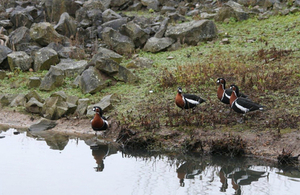Global S&T Development Trend Analysis Platform of Resources and Environment
| Avian influenza (bird flu) in winter 2017 to 2018 | |
| admin | |
| 2018-05-25 | |
| 发布年 | 2018 |
| 语种 | 英语 |
| 国家 | 英国 |
| 领域 | 气候变化 |
| 正文(英文) | The latest updates on avian influenza (bird flu) in winter 2017 to 2018. 
Avian influenza (bird flu), a disease of birds, has been identified in wild birds in England in 2018. All poultry keepers should review their biosecurity, sign up for disease alerts, and register their birds with APHA. Keepers must report any unexplained deaths or sickness to their vet. Public Health England advises the risk to public health from H5N8 and H5N6 avian influenza is very low and the Food Standards Agency has said the disease poses no food safety risk for UK consumers. To-date there have been no detections in poultry or kept birds in the UK, therefore the UK’s OIE country freedom for Avian Influenza remains unaffected. Current situationOn Friday 25 May, the Avian Influenza Prevention Zone was lifted across England. All keepers of poultry or captive birds in England should continue to follow good practice on biosecurity. All disease control measures are kept under review based on the latest scientific and veterinary advice.
UK Chief Veterinary Officer Christine Middlemiss said:
What to do if you keep poultry and captive birdsIf you keep poultry – whether that’s a few birds in your garden or a large commercial flock – you must take steps now to review your biosecurity. You should also:
Review your biosecurityBird flu is spread by direct contact between birds and through contamination in the environment, for example in bird droppings. This means wild birds carrying the disease can infect domestic poultry, so the best way to reduce the risk of your poultry catching bird flu is to minimise chances for them to come into contact with wild birds or their droppings by practising good biosecurity. You must review your biosecurity measures now. This means reading government guidance on good biosecurity and taking action to:
Read and download our advice poster for keepers of poultry (PDF, 1 page). Register your birdsWe encourage all keepers to register their birds with Defra so that we can contact you quickly if there is a disease outbreak in your area and you need to take action. If you have more than 50 birds, you are legally required to register your flock within one month of their arrival at your premises. Find out how to register your birds. Report signs of diseaseIf you suspect disease in your own flock, or you find dead wild birds such as wild ducks, wild geese, swans, gulls or birds of prey, you must let Defra know. Call the Defra helpline on 03459 33 55 77. Sign up for disease alertsBy signing up to the free disease alert system you will get text alerts and emails informing you of the latest news about bird flu and Newcastle disease outbreaks in Great Britain. Findings in wild birdsFindings in wild birds are recorded here. Further information
Recent announcements on avian influenza
Published 21 November 2017
Last updated 25 May 2018 + show all updates
|
| URL | 查看原文 |
| 来源平台 | gov.uk-Department for Environment, Food and Rural Affairs |
| 文献类型 | 新闻 |
| 条目标识符 | http://119.78.100.173/C666/handle/2XK7JSWQ/105977 |
| 专题 | 气候变化 |
| 推荐引用方式 GB/T 7714 | admin. Avian influenza (bird flu) in winter 2017 to 2018. 2018. |
| 条目包含的文件 | 条目无相关文件。 | |||||
| 个性服务 |
| 推荐该条目 |
| 保存到收藏夹 |
| 查看访问统计 |
| 导出为Endnote文件 |
| 谷歌学术 |
| 谷歌学术中相似的文章 |
| [admin]的文章 |
| 百度学术 |
| 百度学术中相似的文章 |
| [admin]的文章 |
| 必应学术 |
| 必应学术中相似的文章 |
| [admin]的文章 |
| 相关权益政策 |
| 暂无数据 |
| 收藏/分享 |
除非特别说明,本系统中所有内容都受版权保护,并保留所有权利。
修改评论